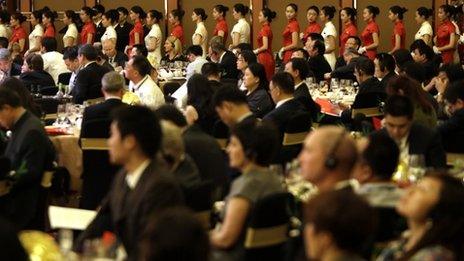China's corruption drive
- Published

No more ten-course banquets - the official line is now three dishes and a soup
GSK may not be the last foreign company to fall foul of China's anti-corruption rules.
Nor is it likely to be limited to foreign companies.
Why? A new urgency to clamp down by the new Chinese president is beginning to bear fruit.
Chinese President Xi Jinping has made clamping down on corruption one of his main aims in his first year in office.
The reason is straightforward: There are tens of thousands of protests across China every year, and many of the complaints are over corruption. With growth slowing, such tensions lying just beneath the surface are more likely to flare up.
Watches
As a non-democratic country that doesn't have the usual safety valves - like the ability to throw the corrupt ones out of office - the tension that can build up may threaten social stability - the very thing that the Chinese government dreads. The word "luan", which means chaos, is one of those the Chinese are keen to avoid.
And, as I mentioned, it isn't likely to be limited to foreign companies like GSK.
Local government officials are very much in the spotlight.
There have been photos posted on China's social media website, Weibo, that show President Xi with local officials who aren't wearing watches but have tan lines where their wristwatch would ordinarily be.
As luxury watches are viewed as a conduit for political corruption, the clampdown has been apparent.
To give a sense of the scale, global luxury watch sales have seen double digit falls in demand from China and Hong Kong, two of the top markets, since Xi took office.
Sociable business
As for foreign companies, one of the toughest parts of navigating China is the line between money spent on corruption versus developing relationships.
When I worked as a corporate lawyer, it was one of the hardest areas to advise on.
Guanxi - or inter-personal relationships or social networks are an important part of how business is done.
Relational contracting means that people prefer to deal with people that they know and trust. It is in part because of the under-developed legal system in China. There is an understandable reluctance to go to court when the judiciary isn't independent.
But, that's not the only reason. As seen in the Chinese diaspora, doing business with those with good relations is a common trait.
This is even the case in countries where there is a well-established legal system like the US. It is, of course, cheaper once the high costs of litigation are considered.
But, it also reflects a cultural difference in that Chinese and many others value getting to know their business partners. In fact, corporate networking is rather important in a lot of places, including developed countries.
'Grease money'
In China, building that relationship often involves not just time, but also gifts and banqueting. That's where it gets rather tricky.
For foreign firms, that's also when it's a good idea to bring in the lawyers. What's worrying is that corruption isn't always easy to detect.
World Bank economist Colin Xu and his colleagues suggest looking at the ETC, or entertainment and travel costs,, external section of a firm's balance sheet.
They find that ETC in Chinese firms reflect so-called "grease money" to obtain better governmental services as well as what they term as "normal business expenditure" to build relationships with suppliers and distributors.
In other words, there is a line, perhaps a fine one, between corruption and money spent on developing guanxi.
In any case, I expect many foreign companies are now scrutinising their books to ensure that they are on the right side of that line.
Finally, there will be those who question whether the Chinese government is serious about its anti-corruption drive.
President Xi has mandated that official banquets can no longer have 10 dishes, just three dishes and a soup. For those familiar with Chinese banqueting culture, this seems rather serious.
Of course, the Chinese president may be serious himself about his anti-corruption drive. But, as with a lot of policies in China, it will be the implementation beyond Beijing that will decide the issue.